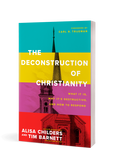|
[Today I'm thrilled to feature this guest post from my friend Diane Woerner. Diane is a brilliant thinker who specializes in the cultural and theological implications of God's design for sexuality, marriage and gender. For more of her writings, visit her website, bereansnotepad.com.] Every year someone comes up with a list of new words people have created, and a number of these make it into the official dictionaries of our culture. At the same time, words get left behind—often without anyone noticing they're gone. Two words I believe to be currently on the endangered species list are these: masculinity and femininity. In their original use, these words simply designated manliness and womanliness, those qualities to which men and women should aspire. But our world is rapidly rejecting any exclusive descriptions of the nature or roles or appearances of men and women. Instead, we all get to think and act and look like any combination of characteristics to which we might be inclined at the moment. How did we get here?
Our sexual natures reside in one of the deepest parts of our being. Only our spirits are deeper, and especially for those whose spirits have not been brought to life by Christ, sexuality usually takes the top role. What we need to realize is that our sexual longings involve far more than a desire for physical pleasure. Rather, our very identity and sense of value run very close to our understanding of ourselves as men and women.
The current trend that promotes and applauds feminine men and masculine women is the result of a complex mix of historical and social factors. One key shift in societal thinking came in the 1960s with the publication of The Feminine Mystique. Its author, Betty Friedan, managed to convince a sizeable number of housewives that their discontent had its source in the fact that men had all the interesting careers of which they were being deprived. As a result, many of the women left their homes—and sometimes their husbands—and found themselves far more fulfilled in the heady "working" world. Over the decades, however, this move shifted from an option to a necessity. With the gradual elimination of husband-as-provider, today's women are regularly forced to support themselves. No longer is homemaking even possible for most of them. And those careers? A lot of them turned out to be far more difficult and draining than the housework their grandmothers accepted as normal for women. Meanwhile, as the men now had to share their jobs with women, they too lost something important. An innate aspect of masculinity lies in its need to prove its strength and significance. Men instinctively seek out places where they can prove their competence and sufficiency in the face of challenges, and a key part of this testing comes through competition with other men. But when women enter the arena, the game shifts. While one or two women might not make a difference, as their numbers grow the men eventually recognize that this particular testing ground is no longer valid. As we've seen, a vast number of men have moved their masculine exercises to the addictive realm of virtual games or live out their manhood vicariously through such things as spectator sports. What has this cost us? There isn't space here to list all of the damages these shifts have brought to our society, but many of them are well known—particularly the damages to families and children. These are very real and very disturbing. But let's look a little deeper for a moment. Feminists often argued that depriving women access to careers meant society was missing out on the gifts and abilities of half the population. What few people seem to be noticing is that the other half of our future population—today's young men—is now fast dropping out of productive society. I would contend that this trend is very specifically the result of our blatant and intentional disregard for God's design for men and women. Men will rise to His assignments for manhood when we acknowledge their place of honor in these accomplishments. What men find instead is a torrent of disparagement directed against them. No longer does "father know best." Rather, in far too many modern movies and stories fathers are buffoons or lazy or contemptible—or absent altogether. Meanwhile, motherhood is often characterized not as a place of deep significance, but rather as something of a career accessory. Girls are not taught domestic skills, so even if they do want to be homemakers they are rarely encouraged or prepared to become such. Marriage itself has been boiled down to a lavish wedding event, with only a few vague thoughts given to the "happily ever after" part. What does all this mean? Obviously I've only skimmed the surface of some very complicated issues. But it is my belief that the sexual upside-downness we're experiencing today is far from an accident of evolution. Rather, I see it as Satan's deliberate and devastating scheme to destroy the very heart of God's creation. Masculinity and femininity have been attacked from the very onset of human history, back in the Garden of Eden. About a year ago, I wrote a lengthy article about this which has recently been published in Touchstone magazine and can be read online. In it I discuss not only what our sexual fallenness has meant to human society and families, but also how it has impacted God's own revelation through His creation. If we are to preserve the life of these two words—masculinity and femininity—and the realities they represent, it will require grace-infused wisdom and courage to stand against their ever-increasing decimation by a very confused and very lost culture. But I see this fight as supremely important, and it is my prayer that Christians will begin to recognize the sexual callings which are ours to preserve and ours to find glory in. 
Diane Woerner is a homemaker who lives near Centerville, Tennessee. Her website is www. bereansnotepad.com.
Please subscribe to have my weekly blog posts delivered directly to your inbox, and join the conversation on Facebook and Twitter!
4 Comments
2/10/2017 02:59:52 pm
Very good article Diane. I unfortunately am part of the male lost culture. I find myself more attracted to the traditional female role. I spent a huge amount of time with my children when they were growing up. Please don't get me wrong, this was very fulfilling and I did a great job as well. But now I find myself looking for something to fill that void. I am a Christian, but have a very weak foundation. This is something i am working on very diligently. But I have a long way to go. I have to agree with you that we as a culture have fallen away from God and are now paying the price.
Reply
2/10/2017 05:18:47 pm
Bob,
Reply
Sarah
5/18/2017 11:08:27 am
Bob, I am so glad to hear you spent significant amounts of time with your children as they grew up. I am sure this impacted them in extremely positive ways. I wonder though, if the current feeling of void has more to do with the changing of life seasons than with a masculinity/femininity discussion. I say this only because I have heard many people express this same phenomenon but most of them are women whose children have grown up (including my mom right now). It seems it is a universally human desire to have a meaningful way to spend our time, and few things are as meaningful as shaping the lives of our children. I honor your investment in the next generation and hope you find fulfillment in this new season.
Reply
12/19/2020 07:05:16 pm
Well said, Diane! Amen! I've often told people that I can't support the bulk of the feminist agenda because they made it hard for me to stay home with my kids for as long as I did. Now that I'm back in the working world, I'm still eyeballing all that nonsense askance. Funny how easy it is to convince people that our source of discontent is someone else's fault instead of our own sinful, selfish natures...
Reply
Your comment will be posted after it is approved.
Leave a Reply. |



 RSS Feed
RSS Feed


